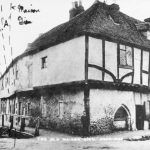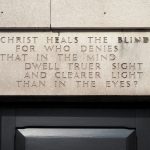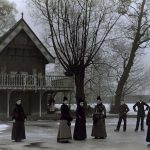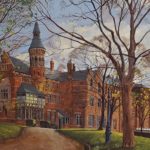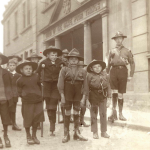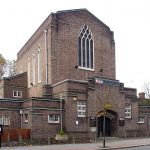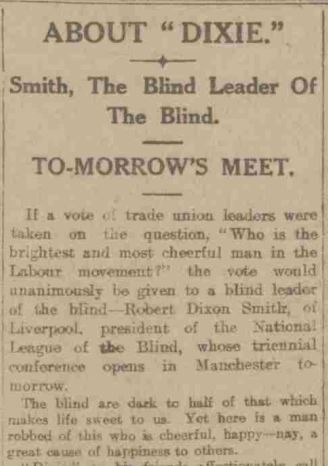Ann, one of our researchers in Liverpool, has uncovered a fascinating person during her newspaper research. Here she shares the story:
The story of Robert Dixon Smith- ‘Dixie’, blind trade unionist and political activist, is one that is worth sharing.
The blind are dark to half of that which makes life sweet to us. Yet here is a man robbed of this who is cheerful – nay a great cause of happiness to others.
‘Dixie’ was born in Liverpool in 1881, and census information suggests that be became blind at the age of ten years old, attending St Vincent’s Blind Asylum in West Derby, Liverpool as a result.
On leaving St Vincent’s Blind Asylum, ‘Dixie’ worked as a basket maker at the Blind Institution in Cornwallis Street. He joined the ‘National League of the Blind and Disabled’, the first trade union for blind people, and became an active member. Dixie attended their trade union congresses and spoke eloquently on behalf of blind and visually impaired people. At one such conference
‘He rose to speak on behalf of the blind, exceeded his time, and the chairman gently reminded him of this ‘It’s alright sir’, Dixie answered cheerfully, ‘I didn’t see you tip the wink –’. The rest of the sentence was drowned in a room of laughter.’
Source: Liverpool Echo 24th August 1917.
By 1917 ‘Dixie’ was married with at least one young child and had risen to become President of the ‘National League of the Blind’. He travelled the length and breadth of the country visiting local branches of the League, and gained a reputation for his humour and cheerfulness.
Source: Liverpool Echo 24th August 1917.
In April 1917, the draft Education Act, known as the ‘Fisher Act’, was published for consultation. ‘Dixie’ used his position as President of the National League for the Blind, to lobby on behalf of blind and visually impaired people:
‘I wish to suggest that Mr Fisher should embody in his bill a special clause which will revolutionise the conditions of the blind. Let him set up a system of technical education which will teach blind children bedding manufacture. It is an easy trade, which they can easily learn. It will give them a living wage. Then let the government earmark that trade for blind people for its own and municipal contracts. What with the needs of the Army, the Navy, and public institutions, it will employ all the blind, and even take them away from such industries as basket and brush making.’
Source: Liverpool Echo 21st April 1917.
Whilst no such clause was added, it was this 1918 Act that raised the school leaving age to 14 and introduced the concept of tertiary education whereby older students could attend university, college or a training establishment after the age of 14. Perhaps the advice provided by ‘Dixie’ had made an impact? The Act also made provision for local authorities to undertake medical assessments of school age pupils, and to provide education for ‘physically disabled pupils’
Source: Education Act 1918

Image depicting marchers with banner that reads ‘State aid for the blind. Not charity but social justice’
‘Dixie’ cared passionately about the rights of blind people. As president of the League, he had this to say :
‘The year that has just closed may properly be regarded as a red-letter year in the history of the League. It was during the course of that year that the most definite and tangible step was taken towards the emancipation of the sightless citizens of the United Kingdom. The main objective…. was ‘to obtain State aid for the Blind by placing the responsibility upon one of the State departments of providing for the maintenance of the dependent Blind by (1) The erection of National and Municipal workshops with the guarantee of a real living wage (2) the establishment of a Technical Schools for the capable Blind who can be made industrially self supporting (3) for the incapable aged and infirm blind their maintenance by pensions adequate to keep them in a proper and humane manner.’
Source: ‘National League of the Blind of Great Britain and Ireland, Seventeenth Annual Report for the year ending 31st December 1917
The links with the October 1790 ‘announcement’ by the Revd. Henry Dannett, one of the men involved in establishing the Royal School for the Blind, Liverpool in the ‘Williams Liverpool Advertiser’ are plain to see
‘Three objects are to be aimed at in affording relief to the blind poor:
First, to furnish them with some employment, which may prevent them from being burdens to their family and the community, or at least render them less burdensome
And secondly that the employment be such as gently to engage the mind without fatiguing it, and by diverting the blind from their unhappy lot, make them less a burden to themselves. And lastly that they be supplied with such a portion of religious knowledge as may reconcile them to their situation
Dannett went on to say
…. a school will be opened in which they will be instructed in music, that they may be enabled to become organists, and to teach music, if they are capable of learning it; and all will be taught to make nets, to knot fringe etc. and as many may be disqualified by age, infirmity etc from learning some of these arts, or from receiving any benefit form the institution – it is proposed, to afford them some pecuniary assistance, in the distribution of which attention will be paid to the moral character of the objects.
Source: Williamson’s Liverpool Advertiser. 22nd November 1972
How interesting that 120 years later, Robert Dixon Smith, President of the National League, and himself a blind person from Liverpool, was reporting that the government was only just beginning to address these issues.
After the war, ‘Dixie’ continued to fight for the rights of blind people. He challenged the Conservative Harry Warden Stanley Child for the privilege to represent Liverpool’s Walton ward as its MP, and whilst unsuccessful (the majority of Liverpool’s MPs were Conservatives at the time) his challenge highlighted the abhorrent behaviour of a Midlands MP who,
‘ …..urged that the blind should be left to begging which was a lucrative occupation, and in the case of the blind, carried no stigma.’
Source: Liverpool Echo 24th August 1917.
In 1920 the National League of the Blind organised marches to Trafalgar Square, from Leeds, Manchester and Newport in support of what became the ‘Blind Persons’ Act’ of 1920. About 80 blind men started the 180 mile walk. Whilst ‘Dixie’ was no longer President of the League, his vision and influence can be seen in the stated aims of the marchers.
‘They have neither change of underclothing nor food. They trust to friendly organisations to provide them with both food and shelter on the way…..
They are timed to reach London on April 25 and will seek an immediate interview with the Prime Minister. The demonstration is designed to excite public interest in the welfare of the civilian blind, and to put pressure on the government to ameliorate their lot by providing them with adequate technical training and with assured employment’
Source: Western Daily Press April 7th 1920
The Act led to closer co-operation between existing agencies for the blind and local authorities, blind person’s pensionable age was reduced from 70 years to 50 years old, and for the first time blind children were allowed to take the same exams as sighted children. The actions of these brave marchers later inspired the Jarrow March of 1936.
There is one word in the English language that he hates more than any other – the word charity because it always pre-supposes an injustice.
‘Dixie’ said that there was one word in the English language that he hated more than any other, the word ‘charity’, because it always presupposed an injustice. His greatest aim was to ensure that blind beggars on the streets would become a thing of the past. His actions matched his words and throughout his life he worked tirelessly to achieve these aims.


